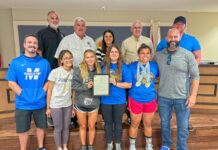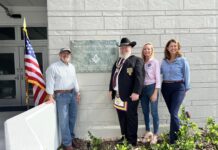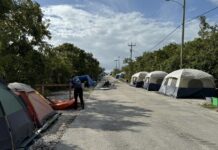The Marathon City Council declined to “upzone” a five-parcel property on Grassy Key. Owner John Timinsky wanted to change the zoning and future land use maps on the five-parcel property (2.6 acres all together) from residential low to residential medium. If the council had approved the change, a developer would have been able to build 13 market rate homes or 26 affordable homes, versus the 1.5 market or 1.5 affordable units that would be approved under its current zoning.
Attorney John Wolfe, Timinsky’s representative, told the council that increasing the allowed density would reduce the possibility of a takings lawsuit. Keys officials anticipate owners of undeveloped parcels will sue local governments in 2023 when the state will no longer issue new development rights in the Florida Keys. But the law only considers it a “taking” when there is NO beneficial use available; i.e., it can’t be developed in any fashion.
“There’s no interest, nobody is looking at it. By changing the zoning, I hoped to have interest.”
“The owner could do a unity of title and put up one home, correct?” asked Councilman Dan Zieg. Staff answered in the affirmative.
The developer in the case of the Grassy Key property is theoretical. Timinsky told the council he only seeks to increase the value and interest in his property for purpose of sale.
“There’s no interest, nobody is looking at it,” he said. “By changing the zoning, I hoped to have interest.”
The theoretical developer would have to secure the building rights first. And there’s the rub.
Councilman Mark Senmartin asked city attorney David Migut if the city could develop some type of “limited liability agreement for developments that get approval … and two years down the road can’t get a permit and come back and sue the city for a taking.”
Migut said the best legal protection for the city is to develop a policy and added he would research it more.
This particular piece of property was completely cleared of Australian pines without a permit following Hurricane Irma. A code fine of $20,000 has been paid to the City of Marathon.
In other news:
- When researching ways to pay for The Quay property, soon to be developed into a city park, staff applied for Florida Community Trust grants. Although the city ended up securing an owner-backed financing deal, the City of Marathon was favorably ranked for FCT funding for two projects — The Quay, and the former Salty’s property, for which the city has made no formal bid. The council elected not to drop out of the funding process, but also asked staff to research other grants. FCT grants have restrictions on revenue generation (for example, leases to vendors) and the match money required is also on the high side.
- The council approved a conditional use agreement with Grassy Key Resort Group. Grassy Key Flats is a combination of the former Casa Del Sol, Bonefish Resort and Yellowtail Inn. The redevelopment of the property does not include any net increase in units.
- The council extended the temporary trailer permits for residents affected by Hurricane Irma for another 90 days. Staff will bring back a full report in 90 days about the number of trailers in Marathon and whether they are owner-occupied, renter-occupied or in storage.
- On June 4, the Marathon City Council will meet to workshop permit and impact fees, and discuss whether a study needs to be commissioned.



























